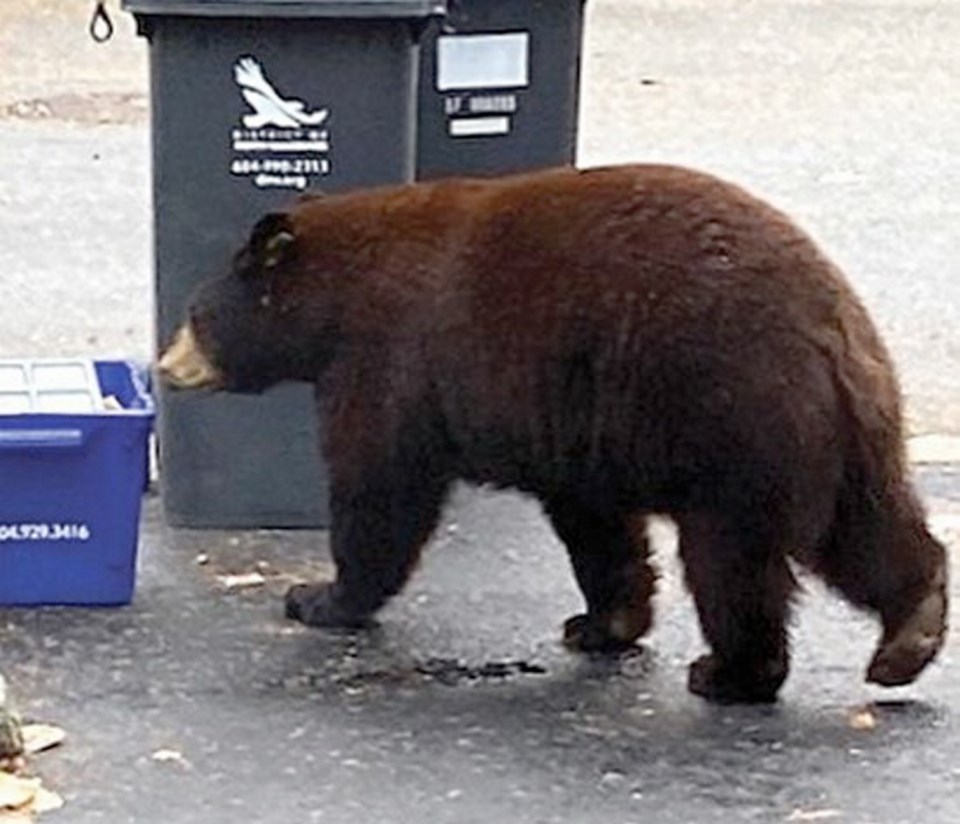Conservation officers handed out a dozen tickets to Islanders in the fall for improperly storing their garbage and other bear attractants.
The tickets were issued as part of a province-wide audit designed to drive the point home that garbage left unsecured leads to dead bears.
“Conservation officers are extremely frustrated and upset with having to euthanize animals when people are not doing what they’re mandated to do to protect bears,” said Scott Norris, a conservation officer based in Duncan.
“Lock up your garbage in a garage or shed all the time. Or make sure you buy locking bear-resistant containers.”
The tickets come with fines ranging from $230 to $575.
Officers on the Island also issued 50 warnings and 34 dangerous wildlife protection orders, which require a property owner to remove a bear attractant or pay a fine of up to $575.
On the Island, conservation officers focused their enforcement in areas that get the most calls related to bears, including Sooke, Lake Cowichan, Shawnigan Lake and Youbou.
Norris said reports of bears in Langford and Colwood are on the rise, and officers will likely focus efforts in those municipalities in the spring.
He expressed disappointment with a public perception that all conservation officers do is kill bears, saying euthanization is a last resort when the animal has become too habituated to eating garbage and spending time in areas where people live.
“It’s the most frustrating and upsetting part of my job when I have to euthanize a bear,” he said.
That’s why Norris asks that people report bears in residential areas as soon as they see them. Waiting days or weeks means it will likely be too late to save the animal.
Norris said social media has played a role in discouraging people from reporting bears to conservation officers — people are often told that if they report the animal, it will be killed. But delaying reporting actually makes it more likely a bear will be euthanized, he said.
Norris said people often ask why conservation officers can’t just relocate bears instead of euthanizing them. He pointed to an example from September, when conservation officers tranquilized a bear in View Royal and moved it about 20 kilometres away, into the bush.
“The bear was seen two days later on a property in Metchosin,” he said. “In less than a few days, it was back in View Royal.”
Another public misconception is that all bears hibernate all winter long.
Norris said that’s not the case, especially on the Island, where winters are mild and bears that have been eating garbage are more likely to wake up during their hibernation.
“Bears that have been feasting on garbage haven’t built up the calories to last through winter,” Norris said.
“They’ll find a den close to town and come out periodically throughout winter, because they’re hungry, and they know there is a food source nearby.”
The province receives more than 25,000 reports of human-wildlife conflicts every year, many of which are related to bears and unsecured attractants. Hundreds of bears are euthanized every year as a result of conflicts, according to the province.
B.C. co-ordinated enforcement efforts in the summer and fall in an effort to reduce those numbers.
Conservation officers patrolled neighbourhoods looking for garbage that was left out, fallen fruit not picked up and livestock that was not protected by electric fencing.
Across the province, 76 tickets, 301 warnings and 335 dangerous wildlife protection orders were issued.
regan-elliott@timescolonist.com
Tips for managing bear attractants
• Store garbage in a secure building until collection day, or buy a bear-resistant
container.
• Do not leave garbage in the back of a truck, even if it
has a canopy.
• If you don’t have somewhere to store garbage securely, freeze smelly items and put it in the bin on the morning of collection.
• Feed pets indoors, and store pet food in a secure location.
• Do not put fish, meat, fat, oils, un-rinsed eggshells or cooked food in compost.
• Clean barbecues after use by burning off the grill completely. Cover the barbecue or store it indoors, leaving the propane tank outside.
• Do not let fruit from a tree accumulate on the ground.
• Use electric fencing to protect livestock.
Source: Wild Safe B.C.



